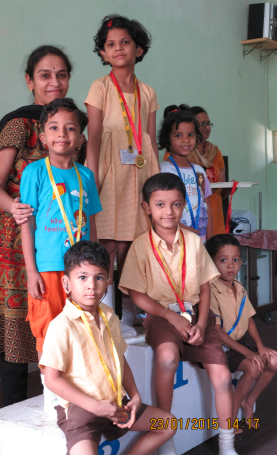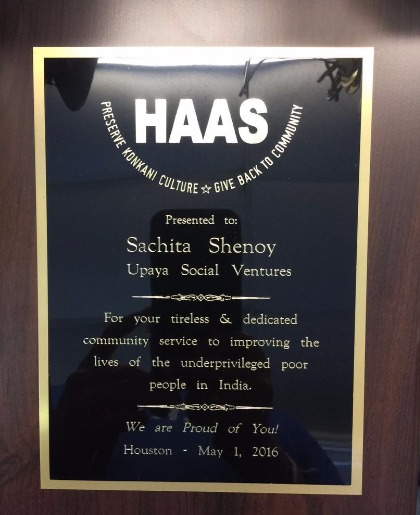The Sounds of Success
Shobha Nakhare, Principal, The Central School for the Education of the Deaf (CSED), has been presented with the Presidential Award on the occasion of Teacher’s Day. This article by Ms. Nakhare gives insights about the school.
When the mother of Shubham and Pooja, a deaf brother and sister, came to tour the school along with her kids, she thought she’d come to the wrong place. She took the school elevator, arriving
during the school’s lunch time. The kids were busy eating and having fun at the same time. There was so much noise, that their mother began to wonder. “If this is a school for the deaf, then why are
these kids so loud? I have probably come to the wrong school”. She came back down the elevator and checked the school address again. “No… I am at the right place and the right school.”
For the past 50 years, The Central School for the Education of the Deaf (CSED) has been striving for the betterment of deaf kids and to direct deaf kids in the mainstream of society. CSED accommodates kids from age 2 to 12 studying up to 4th grade. The school is trying to strengthen the language skills and hearing and speaking abilities of these deaf kids and put them into mainstream special schools.
This school is located at Agrpada between Mumbai Central and Byculla stations. Kids from around Mumbai—including as far as Panvel, Kalyan, Neral, Boisar, Dahanu, Virar, and Dombili—come here to study. Likewise, kids from other parts of Maharashtra—Akola, Dhule, Ichalakaranji, Saangli, Aurangabad, Nagpur, and so on—also get admission into the school.
What is the reason these young children come all the way from different parts of the state to this school in particular? The answer to this question is very simple—oral communication. When kids are taught orally, kids are also expected to communicate by listening and respond back by talking. Overcoming hearing impairments and enabling oral communication are the school’s main goals. The specialty of this school is that they teach deaf children to communicate without using sign language.
At the time of admission into the school, the kids who will learn the oral communication method of teaching, are unable to talk and do not recognize words. That is the reality. But after joining this school, the students are exposed to diverse activities, such as sports, various crafts, and hearing tests, which slowly help them to understand language and they improve vocabulary through great efforts from their teachers. Initially, we expect the kids to speak in a very low voice. How do teachers do this? These deaf kids generally have very low hearing ability. Good quality digital hearing aids are required to improve their hearing ability. Each hearing aid cost ranges from 60,000 to 150,000 Indian rupees ($1,000 to $2,500). Their hearing ability is enhanced, and a great effort is put for them to hear because talking and listening are like two faces of a coin.
Children who have stopped oral communication join this school. Initially when kids are young, mothers ask their kids questions and when kids do not answer, mothers show their love and answer their
questions themselves. (For example: Are you hungry, dear? Yeah yeah… let’s drink some milk). Similarly, kids start interacting with others. However, teachers give names to every item the kids bring
to school, and due to this, kids build a different relationship with the teachers and start blossoming. Kids start bringing toys like toy cars or balls to school and start explaining those items
using two- to three-word sentences. Later, there is a follow-up on these explanations. By constant interaction through language, the kids slowly start talking. These communications will then be
linked with math, science, hearing, writing, history, and geography. Enhanced hearing and follow-up is very important for this to happen.
Low-income families cannot afford these expensive hearing aids. Moreover, such types of hearing aids last only for about 5 years. Many kids will not be able to get the benefit of these hearing
aids without the help of donors and their generous donations. Another important factor for the kids’ success is the parents’ active involvement in the program. Parents have to constantly work with
their kids at home and practice whatever the kids are learning at school, without which kids will not be able to grasp the concepts they are learning. Parents should be ready for this hard work and
dedication, which is important for success of this program. Kids are exposed to various extracurricular activities. They are engaged in dance, skits, fancy dress, art, poetry, essay, and elocution
completion on every Thursday for an hour. (They will develop breath control too due to these activities.) Every day, kids come across new experiences, interaction with others, sports. They develop
various skills such as reading, writing, books, and other language experiences.
What happens due to strengthening the foundation? To date, nine kids from this school have attained “middle school scholarships” and have excelled in their grades in Mumbai. Last year, 16 kids
stood first in the “Maharashtra Talent Hunt” test. Seven children have topped in Mumbai in that test. These children conducted a 30-minute show called “Gammat-Jammat (Fun-Won)”, which was broadcasted
on Akashvani (All India Radio). They recorded this show in one shot!!
Our students also take part in inter-school competitions. They have also won many competitions held by community organizations. They have excelled in historical elocutions, stand-up comedy, and poetry recitation conducted by Mahim Public Library. They have won many prizes in competitions held by Friends of the Trees, Mumbai Traffic Police, and other community organizations. Also, the kids have recited 10 Sanskrit shlokas.
Our students later attend nearby mainstream achools after they complete 4th grade in CSED. Sharanya Manoharan Jha was in CSED till 4th grade. When her parents took her for admission to a nearby school, the new school’s management showed their reluctance to admit this special ed child. Later on, she was presented with the “Precious Gem of the Year” (2015–16) award by that new school!!!. This is not unusual. Most of our kids win various competitions and handwriting challenges. The school’s students attain higher education conquering all sorts of hurdles. Lot of students have gone on to be successful in various fields such as engineering, computer science, interior design, architecture, and so on as well as getting degrees such as MBAs, MAs, and MCAs. Lots of them are employed in railways, BEST (Electricity and Transportation), and other fine companies. Many of them are also self employed. They have won recommendations in the fields they are working in.
One student named Lata Nayak is employed with the Indian Railways. She has won the Best Employee Award 15 times! Her swimmer brother, Taranath Shenoy, was awarded the Arjuna Award, Chatrapati Award, and even the Padmashree Award. He is literally one of the best examples of a CSED success story.
Rhoda and Adal Parakh started CSED in 1966 from their living room. It also served as a teachers’ training center until 2005. Nearly 500 teachers received their training here and have gone on to
teach all over Maharashtra. An infant training center called Maitri (Friendship) was being run free of cost. There is a mapping facility available in the school for kids who have undergone cochlear
implant operation. The educational curriculum and school activities are implemented in this school through newsletter of this organization.
Mary Behl, CSED President, is the daughter of the Parakh couple and well educted in childcare. Shubada Burde, CSED Director, is involved in training teachers all over India through lecture programs. She is also the main instructur of oralism in RCI, Delhi and vice president of NCED India, a national organization. The school also has been presented with the Colaba Women’s Development Institution Excellence Award. Teachers of this school are active in research, and they have published 10 to 12 research papers in national institutes. They have won best-research paper awards 6 to 7 times. Mr. Shobha Nakhare, Principal, CSED, has received numerous awards as well, including the prestigious president’s award. She continually strives to spread more social awareness about our school’s mission.
We have proved to the national school organizations that children will be highly benefitted if the oral method of education is followed in all common schools. Our goal is that more and more people should benefit from our institution.
Ms. Nakhare can be contacted directly if you would like to receive more information or visit the school and meet students.
Shobha Nakhare
Principal, The Central School For Education of Deaf
Agripada, Mumbai – 400011
Phone number: 022-23088879
This article is first published on “MahaNews” web portal of “Government of Maharashtra”. We will be glad if re-printed mentioning “MahaNews”.




